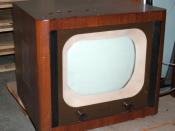Contributions of TV
Television- the system of producing onscreen images of distant objects and events by electromagnetic radiation. TV is the most widely used mass media form in the world. Television is one of our most important means of communication. It brings moving pictures and sounds from around the world into millions of people's homes. The utter amount of time that TV occupies in people's lives has it's affects on culture as well as culture has on it.
Many scientists contributed to the development of television, so no one person can be called its creator. Television became possible in the 1800's, when people learned how to send communication signals through the air. By the early 1900's, it was possible for operators to transmit words. In the meantime, many scientists had done experiments involving the transmission of pictures. It was in the year of 1884 that Paul Gottlieb Nipkow of Germany invented a scanning device that sent pictures over short distances.
His system however, worked electronically, unlike the way television works today, which is mechanically.
In 1926 J.L. Baird of England gave the first display of true television by electrically transmitting, to a degree, moving pictures in. The results although flickering severely with a dim receiver became the start of modern television.
In the late 1940s television began to make its presence exposed. World War two had temporarily halted its development, but once the war was over television sets were put on the market. The first mass television audience watched the broadcast of baseball's World Series in 1947. This event prompted people to go out to buy sets. And the selling of sets, in turn, prompted the networks to expand their programming. Regular television broadcasts began in 1953, and perhaps the most significant part of television history was the landing of...


